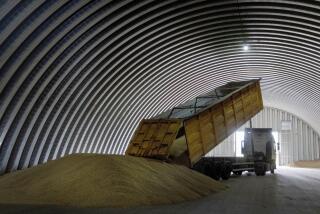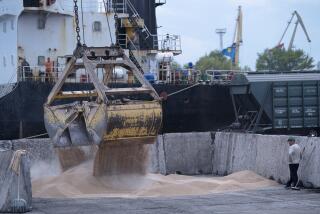Common Market May Ban East Bloc Food Items
- Share via
BRUSSELS, Belgium — European Economic Community officials on Tuesday proposed banning imports of vegetables and other foods from the Soviet Union and five Eastern European countries that are within 620 miles of the Chernobyl nuclear disaster.
The proposal also said that the 12 members of the trading bloc should not use the accident as an excuse to ban food imports from member countries. The April 26 disaster sent a cloud of radioactivity over much of Europe.
The European Commission, the trading bloc’s executive branch, proposed the ban and sent it to Common Market ministers for approval Tuesday, but the ministers passed it on to a panel for further study.
Some Bans in Effect
A decision could be made later this week, according to diplomatic sources who spoke on condition of anonymity. Many European nations have already imposed their own import bans.
The Common Market ban would cover fresh fruits, vegetables, dairy goods, meat and fish from Bulgaria, Hungary, Poland, Romania, Czechoslovakia and the Soviet Union. The Common Market imported $648 million in food from those countries in 1985.
The commission also proposed uniform nuclear contamination standards for milk and other dairy products as well as fruits and vegetables.
The proposed guidelines generally conform to the national standards of Common Market members and are meant to keep a member nation from banning food imports from another member nation under the guise of a health risk.
“No member state must apply to products originating in another member state stricter measures than those applied to national products,” said a commission official who spoke on the condition of anonymity.
Health Group Meets
Meanwhile, in Copenhagen, the World Health Organization held a one-day meeting of experts to assess the public health effects of the Chernobyl disaster on behalf of its 140 member states, who have asked for “urgent advice” on the situation and its future consequences.
At a news conference after the meeting, an official of the group said that precautions against radiation generally are needed only around the stricken Soviet nuclear plant and that some measures taken by governments are unnecessary.
“There is not and has not been any immediate danger outside the immediate accident area” at the Chernobyl power plant in the Ukraine, said Dr. Jean-Paul Jardel, director of program management at the U.N. agency’s European regional office in Copenhagen.
Among the unnecessary measures he listed were staying indoors, avoiding ordinary water and taking iodine tablets. Jardel said both cow’s milk and mother’s milk are safe.
However, he said that restrictions on milk from grazing cows in areas where heavy rainfall coincided with the passing of the radioactive cloud may be justified if unusually high concentrations of iodine-131 have been detected, “but this is valid only for the next few weeks.”
Milk Restrictions
Many governments have told farmers to keep their cows away from pasture and recommended against eating leafy green vegetables or drinking rainwater.
Jardel insisted that there is no reason to bar food imports from Eastern Europe, and “there is no scientific reason to prevent people from traveling through Europe except in areas in the immediate vicinity of the accident site.”
The Copenhagen meeting was attended by experts from 12 countries. A Soviet official declined an invitation to attend, without explaining why, and was replaced by the scientific attache from the Soviet Embassy in Copenhagen.
More to Read
Sign up for Essential California
The most important California stories and recommendations in your inbox every morning.
You may occasionally receive promotional content from the Los Angeles Times.













